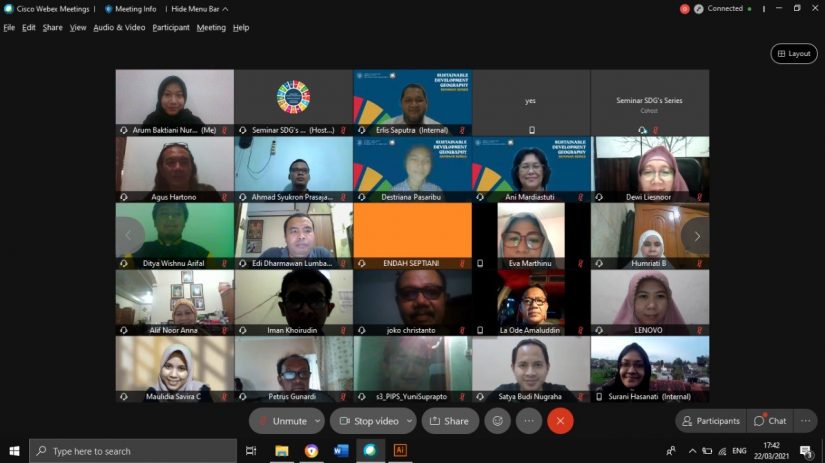
Department of Development Geography, Faculty of Geography, Universitas Gadjah Mada as a host in collaboration with FORPIMGEO (Higher Education Leadership Forum for Geography and Geography Education) throughout Indonesia, and LEAD (Leadership for Environment and Development) Fellow held a monthly seminar on Sustainable Development Goals (SDGS) The # 63 Seminar Series on Monday, 22 March 2021 with the theme “Development Leadership in Water Resources Conservation and Management”. The seminar was held online using Webex media and live Youtube. The speakers in this series were Prof. Dr. Ani Mardiastuti (Professor of the Bogor Agricultural Institute/Institut Pertanian Bogor, Fellow LEAD) and Prof. Dr. Dewi Liesnoor Setyowati, M.Si. (Professor of Semarang State University/Universitas Negeri Semarang and FORPIMGEO Advisory Board). This seminar should had been hosted by Dr. Erlis Saputra, M.Si. (Head of the Department of Development Geography, Faculty of Geography UGM) and moderated by Prof. Dr. M. Baiquni, M.A. (Professor of Universitas Gadjah Mada and Chairman of FORPIMGEO). However, due to health issue Prof. Dr. M. Baiquni, M.A. was unable to attend. At the end, Dr. Erlis Saputra, M.Si replaced him as moderator. This series discussed the Sustainable Development Goal 6 (Access to Clean Water and Sanitation) and the Sustainable Development Goal 13 (Handling Climate Change).
The first session was started by Prof. Dr. Ani Mardiastuti. The presentation began with an explanation regarding the area of the earth which consists of 3/4 of water, but it turns out that there are still many people on earth who face water deficiency. This is because not all water on earth can be used for human life since its composition on earth are 97% sea water and 3% fresh water. This very small amount of fresh water can be used by humans but it should be used carefully. The theme of World Water Day in 2021 is to appreciate what water means to humans, its true value, and how we enhance the protection of this vital resource. The five dimensions of National Water Security are health and sanitation, related sectors, water management, government and environment, and disaster risk. The Indonesian National Water Index is not too high but not too low either. Hence, Indonesia still needs water management. Regarding leadership in water management, there are six roles of leadership consist of champion leader, enabling leader, cross-boundary team leader, thought leader, strategic leader, trusted advisor. We need to become leaders for ourselves or self-leadership so that water on earth can be used for a long time. Self-leadership has three steps, starting from having awareness, having motivation, and managing ourselves. In addition, it is also necessary to start leadership in all directions: leading down (students), leading sideways (colleagues, families, neighbors), and leading up (leaders).
The second session was continued by Prof. Dr. Dewi Liesnoor Setyowati, M.Si. (Professor of Semarang State University/Universitas Negeri Semarang and FORPIMGEO Advisory Board). “The enhancing development on the surface of the earth does not mean conquering or destroying nature, but rather making the environment as supporting capacity for the sustainability of human life. Therefore, a balance is needed between the needs of human life and the availability of water resources”, she said to start her presentation. One of the consequences of rain on the earth is flooding that occurs in various areas, for example in Jakarta, Banjarmasin, and Semarang City. Semarang floods are caused by high rainfall, land subsidence, land conversion and forest damage, as well as a lack of human awareness regarding waste and the availability of drainage facilities. There are about nine drainage systems in Semarang City. Hence, the sustainable leadership is needed particularly a leader who can always monitor the usage and the effectiveness of the drainage system. Sustainable leadership can play a role in various aspects such as economic, social, cultural, and output. A growth leadership model can protect sustainable natural resources. It starts from growing leadership, strengthening leadership, building networks, being able to weather storms, and being responsible for creating new shoots. It is said that it grows since it starts from self-leader then it evolves to broader scale, a family leader, a country leader and a world leader.
The discussion continued with a very interactive question and answer session which was preceded by a presentation from the moderator, Dr. Erlis Saputra, M.Si. He explained, “There are few things to consider, namely self-awareness, sustainable leadership, self-leadership, including the six leadership models, to the outstanding things that exist among students and lecturers, which we must always foster so that their leadership can work”. Then the discussion was ended with closing remarks from all of the speakers. Prof. Dr. Ani Mardiastuti conveyed, “The most important leadership is leadership towards yourself, so do not be bored to learn in improving yourself. Water is already scarce and has become very valuable, so let’s conserve and use water wisely so that all of SDGs can be achieved “. Prof. Dr. Dewi Liesnoor Setyowati, M.Si. said, “Care for water, always save water, and use water wisely. Starting from ourselves and then developing it in our surrounding environment such as family to wider environment and becoming a wise leader”.
We would like to invite all readers to attend the next SDGS Seminar Series Forum with another interesting themes and discussions. We would also like to invite all colleagues to be part of discussion in the SDGS Seminar Series. Keeping up with us on our Official Instagram @sdgsseminarseries and the Seminar SDG’s Series Youtube Channel and the Citrakara Mandala Channel on Medium.
